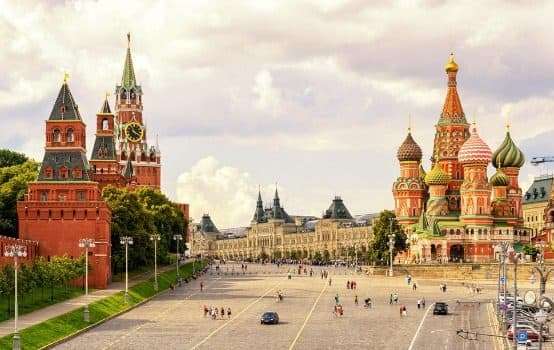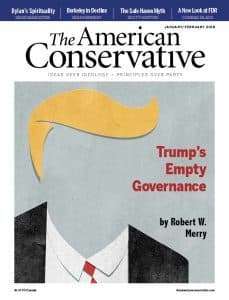
Amidst the firestorm of U.S.-Russia recriminations and closings of diplomatic facilities this past September, and on the heels of an intense, year-long American campaign to demonize all things Russian, a project calling itself the Simone Weil Center for Political Philosophy organized a conference in Moscow. Our gathering took place in the offices of the Institute for Socio-Economic and Political Research (ISEPR), a Moscow-based think tank. Attendees included the Russian philosopher, Boris Mezhuev of Moscow State University and ISEPR; Mikhail Remizov, president of the Institute for National Strategy, a think tank; Leonid Polyakov, ISEPR; Dmitri Drobnitsky, a leading political affairs commentator for the journal Vzglyad; Egor Kholmogorov, a well-known essayist and presenter on Tsargrad, a religious/nationalist Russian television station; and several other prominent Russian scholars.

This article appears in the January/February 2018 issue of TAC.
The goal of the conference, reflecting the Simone Weil Center’s general mission, was to explore the political questions separating Russia and the West and thus to seek ways of getting beyond the present dead end. There were about 15 of us in attendance, both Russians and Westerners. The Russian academics, journalists, and think tankers were generally conservative in orientation. The Western delegation, which included university professors, journalists, and writers from the United States, Canada, the United Kingdom, and Australia, was more mixed in ideological terms. Several would be comfortable being designated as conservative, while others would call themselves “post-liberals” or perhaps “liberal realists.”
We began our talk with a question: why has reason disappeared from the relationship between Russia and members of the Atlantic Alliance? Conversation is a form of human interaction where the force of reason, as opposed to force of arms, holds sway. But today the words of mainstream politicians and pundits rarely seem to serve the purposes of conversation. Hostility resides just below the surface.
Reason’s disappearance appears perplexing when one considers that both Washington and Moscow appeal to a rules-based world order. But Professor of Public and International Affairs at the University of Ottawa Paul Robinson explained at the conference that the two nations have entirely different interpretations of what the rules are and what they’re meant to achieve. For Russia, said Robinson, rules are symmetrical. They apply in the same way to all sides in a conflict. For the United States, the application of rules is asymmetrical, determined by whether a given side is deemed just or unjust.
This dichotomy, Robinson argued, stems from recent innovations in what is known as “just war theory.” Traditionally, just war theory has accepted that, whoever is at fault (or more at fault) for starting a given conflict, the rules of actually waging it must be the same for every participant. The reasons are practical: unless the rules apply to all, they will be disregarded by all. The United States, said Robinson, now effectively rejects such symmetry. In this view, rules apply mostly to the just. As criminals being chased by the police must surrender and accept arrest, soldiers on the wrong side of a war must yield to those who hold the moral high ground.
But who gets to define what is just? And what does justice mean? For the United States and its closest allies, the liberal states get to decide, precisely because the concept of justice is wrapped up primarily in the idea of “respecting individual human rights,” as developed over the course of history in the West. Based on this theory, civilian casualties incurred during the U.S. liberation of Mosul or Raqqa were regrettable but justified, whereas civilian casualties incurred during the Russia-backed liberation of Aleppo were morally unacceptable. As Russia and Syria don’t share the United States’ understanding of human rights, neither, from the U.S. perspective, can be “minimally just.”
In short, the United States and Russia are both rational, but, in classic Alasdair MacIntyre fashion, are operating according to differing rationalities. Is there some way to bridge the difference? It seems unlikely that the United States will abandon its liberal logic and equally unlikely that Russia will yield its own more traditional realism, to say nothing of its non-individualistic civic outlook.
Thanks to Robinson’s remarks, the political problem took on a starkly clear philosophical form, which helped frame the rest of the conversation.
Perhaps reconciliation between Western liberalism and Russian realism cannot be achieved, and therefore shouldn’t even be attempted. That, to summarize it perhaps too simply, is the gist of the civilizational realism proposal put forth by Boris Mezhuev. He does not argue that conflict between civilizations is inevitable, though he acknowledges that differences on matters of principle go to the essence of their relations. But Mezhuev believes that only by recognizing the depth of such differences can we withdraw from competition and, at last, enjoy a stable live-and-let-live accommodation.
Mezhuev acknowledges that Russia certainly has cultural affinities with Europe and other states of the Atlantic bloc. But no one argues that those affinities are definitive. The key to achieving a modus vivendi, in Mezhuev’s view, is overcoming the misplaced moralism that insists on recognizing one way of life as universally and exclusively the most humane. Is it more human, more moral, to be European as opposed to being Russian? No, these are simply two different, existential choices. Ukraine has every right to be in the West if it so wishes. But it also has a right not to. Both sides in Ukraine’s Civil War have the “right” to be either with the West or not.
To drive home his point, Mezhuev cited a recent New Yorker article by Adam Gopnik, “We Could Have Been Canada.” In reference to the U.S. Revolutionary War, Gopnik argued that the choice for England was no more, and also no less, moral than the choice for independence. Who can seriously maintain, Mezhuev and Gopnik ask, that those Americans who, in 1775, preferred to stay with England were morally evil? In such a context, the concept of morality clarifies precisely nothing.
On the other hand, Mezhuev acknowledged, if avoiding moralism is crucial to creating a stable international order, doing so raises other problems. How, notably, can we avoid slipping into some sort of Nietzschean relativism or amoralism in international affairs? Isn’t something universal still needed, all the same? No side wants to sit by passively during another Rwandan genocide, after all. But what would that something be, if it is not human rights?
Perhaps it’s a sign that any political order has gone off the rails when Carl Schmitt starts sounding like a moderate. But in his Concept of the Political the famous German jurist and political philosopher writes “To confiscate the word humanity, to invoke and monopolize such a term probably has incalculable effects, such as denying the enemy the quality of being human … a war can thereby be driven to the most extreme inhumanity.” In this light what Robinson and Mezhuev together seem to be saying is that the absolute moralization of political differences, including by reference to the concept of “human rights,” can have the unintended consequence of making human conflict open-ended, limitless both in extent and intensity, and capable of being overcome only through the total surrender of one party. Are we sure that we really wish to hold relations with Moscow hostage to that logic? Are we even aware that that is what we’re doing?
A human rights-based logic may work well enough within a liberal civilization of the American or Western European sort. But the reflections of Schmitt reinforced a consensus that emerged around the conversation table in Moscow. Whether intentional or not, the practical effect of such a human rights-based order is to give the United States a free hand to use force without limit wherever it sees fit. What’s more, by assuming the role of arbiter of human rights, able to update at will the definition of what constitutes a right, the United States can keep competing powers off center and permanently in the international moral doghouse.
Of course, in reality such an American-led order may appear no worse than various alternatives, such as the global dominance of a particular order that could be even worse; or constant warfare, whether cold or hot, between and among competing civilizational “blocs,” which is the anti-utopian promise of aggressive modern realists. Is anything better on offer?
One Russian answer is civilizational realism: effectively letting the West be the West and Russia be Russia. It recognizes that Russia and the West have in the years since the end of the Cold War embarked on developing their societies on two separate orders and accepts that pragmatic cooperation between them is better than an attempt by either party to impose its social or political order on the other.
For example, Mikhail Remizov describes Western Europe as having left behind its roots in Christianity as well as modernity. Its post-modern, post-national project is oriented toward rights, individuals, and emancipation. The Russian state, he argues, should not have, and does not have, any pretensions to challenging that project. As he put it in an exchange with Robinson, “I see Russia not as a superpower, like in Soviet times, which opposes the Western world and gathers together its own world, but rather as a rebel province of the global empire.” The global empire here refers, of course, to the American-led liberal order. The question is: how far can this empire actually tolerate such renegade provinces?
The answer might have to do with the extent of these renegade provinces’ ambitions and the degree of threat they pose to the ideological unity of the empire’s core territories—that is, in our time, the Euro-Atlantic world and its unifying creed of progressive, liberal globalism (the “New Atlanticism,” in the terminology of the University of Kent’s Richard Sakwa). Given this question as applied to today’s world, it was perhaps significant that, in Moscow, Egor Kholmogorov emphasized that Russia’s conservative foreign policy intellectuals are essentially isolationist, or at any rate inward-looking. This relates, he said, specifically to such leading lights as the late Aleksandr Solzhenitsyn and Vadim Tsymburski. Even the much-demonized Alexander Dugin, the far-right and intensely nationalist Russian advocate, is “essentially” isolationist, said Kholmogorov, adding that, while Dugin’s concept of land powers vs. sea powers “may be absurd” in various respects, even here he emphasizes that hard borders between them should be respected.
This is what we heard in Moscow. The question now in Washington, it seems, is how far such statements can be taken at their word. After all, how is one to answer the complaint that such statements are necessarily untrustworthy? For the hard-nosed realist, the urge to expand one’s sphere of influence is predicated not on philosophical conviction (whether feigned or sincere), but on the reality of international anarchy.
But maybe this is to frame the problem the wrong way. As James Carden, foreign policy writer for The Nation, elegantly argued in a paper delivered at the conference in his absence, ours is not the first generation in the history of the world to have navigated an international disagreement about founding political principles. Others have done so and managed to maintain a relative peace and stability in the world. Isn’t this after all the essence of diplomacy?
Perhaps. But as Carden explained, America’s attitude toward Russia has long since ceased to be motivated by a desire for regulating differences diplomatically. Instead, he argues, Washington manifests toward Russia “a hostility borne of a frustrated project of liberal cultural imperialism.”
Carden is not personally opposed to American identity politics. Indeed, he is “not in the slightest bit perturbed by the decision the U.S. Supreme Court came to in Obergefell v. Hodges— the gay marriage decision.” On the domestic level, he believes identity politics has led to some estimable gains for underrepresented communities in the United States. What worries him, though, is that, by choosing to carry over the claims of identity politics into relations with the rest of the world, and particularly with Russia, the United States has allowed “social justice impulses” to undermine any responsible and rational foreign policy.
Demonizing Russia for violating the norms of American identity politics first emerged as a tactic during the Obama years, well before the events in Kiev’s Maidan Square. Regime change enthusiasts noticed that identity politics could become for them a useful tool. That’s when U.S. media and other elites began making cause célèbres out of every Russian failure to order its domestic affairs in ways pleasing to American media and foreign policy elites. The Pussy Riot case was only the most noticeable.
Since then the range of sins attributed to Russia and its leaders has expanded exponentially, transforming Vladimir Putin into the global leader of the extreme right. But of what relevance is this to the formulation of U.S. foreign policy? Carden invoked the scholar-diplomat George F. Kennan, who once observed that the “moral obligations of governments are not the same as those of the individual.” He decried “the histrionics of moralism,” by which he meant “the projection of attitudes, poses, and rhetoric that cause us to appear noble and altruistic in the mirror of our own vanity but lack substance when related to the realities of international life.”
This was a cue for Carden to find within the liberal tradition itself an alternative to this “culture war liberalism.” Notably, Princeton scholar Jan-Werner Muller has defined a healthy school of Cold War liberalism, exemplified by among others Isaiah Berlin and Raymond Aron, for whom the primary concern was avoiding the worst rather than achieving the best. Unlike today’s identity politics as applied to foreign relations, this kind of “Cold War” liberalism is fearful of ambitious programs and utopian projects, resting on a caution that contrasts favorably, Carden concluded, with “the smug certitudes of our new Culture War liberals.”
This resonates with a key concept for Simone Weil, one she linked closely with the Christian idea of limit. For Weil, Greek thought and Christian thought were alike in their understanding of the centrality of limit, its profound symbolic importance, summarized for the Greeks by the word “hubris” and by the Christians in the word “pride.” An older, less positivist, more classically trained school of realists were likewise deeply familiar with this concept of limit, as well as its opposite—hubris or pride.
Is the problem, then, for Western diplomacy (such as it is) to be found far upstream of its immediate disagreements with Russia—in the prior collapse (some might say deliberate destruction) of the authority of precisely those sources of classical and Christian wisdom that once warned the executors of U.S. foreign policy off the limitless ambitions that are so intimate a part of the permanent revolution of identity politics?
As Nicolai Petro, professor of political science at the University of Rhode Island, observed, even among so-called “conservatives,” U.S. foreign policy is conservative only in a nominal sense. To Petro, conservative foreign policy must be guided by a realism that would abandon the imposition of Western standards of secularism and ideological moralism everywhere. But what if, as Petro asks, “moralism” is simply who we are in the West now? The solution, Petro suggests, might be in expanding the West’s own self-identity. We have come to view globalization as a synonym of Westernization. We have to think our way out of this habit—to become broader, more capable of incorporating insights from the rest of the world.
This is almost certainly the right approach. But it doesn’t take much to imagine how difficult this will be. For the better part of the last four decades, liberalism has been assumed across the board as the essential solution to any given policy question in the West. What we see in the failure of our relations with Russia, however, is that when it comes to organizing peaceable relations between states, liberalism is actually part of the problem.
This was the point made by Richard Sakwa in his wide-ranging critique of what he memorably calls liberal “monism.” Despite its claims to “open-ness,” liberalism in its late modern Western form becomes self-contained to the point of closure. Allied with such power constructs as the “liberal world order,” globalization (a word that came into common usage only after the fall of the Soviet Union) tends towards the homogenization of political space and the radical constriction of pluralism.
An alternative to this homogenizing (and essentially imperial) political logic can be found, Sakwa believes, in the dialogical approach associated with the work of the Russian Dostoevsky critic and theorist Mikhail Bakhtin. Dostoevsky’s characters change over time, often unpredictably, precisely through conversations with one another. They model—and this is the relevant political lesson for the West today—a type of conversation where both sides speak and listen and learn.
Whereas the liberal globalization model is axiomatic and axiological (in the sense that it already knows the answers), the dialogical approach is transcendent in the sense of being oriented to a horizon that is never fully determined in advance nor fully definable. That horizon, in the case of Russia, is of a spiritual, sacred order.
Mezhuev returned to this theme in a second contribution. Russia, he says, shares with the United States and the West the idea of having a “special status,” a special future. With the Russian philosophers Nikolai Berdyaev and Vladimir Solovyov, Mezhuev believes there is such a thing as the Russian idea, which is first and foremost the Christian idea. The literature inspired by this offers us a potential way out of the current impasse. This leads, once again, to Dostoevsky, whose The Brothers Karamazov, says Mezhuev, was the last openly Orthodox Christian novel, in Russian classical literature, until the appearance of Boris Pasternak’s Doctor Zhivago in 1957. But, like Simone Weil, Pasternak could not accept the Old Testament because it introduces the idea of the “chosen.” For Mezhuev, chosen-ness in the Biblical sense must be accepted as a mystery, but a civilization that declares itself “chosen” veers necessarily toward amoralism.
For that reason, Mezhuev says his own Civilizational Realism should not be mistaken as a fig leaf for civilizational chauvinism. On the contrary, inspired by the works of the Russian classicist and geopolitician Vadim Tsymburski, for whom hubris was a key concept, it places particular emphasis on the idea of limits. Because it is a Christian civilization, Russia must accept with humility that the world contains varied civilizations. Russian civilization might possess, providentially, a special relationship with what it at least takes as universal truths. But it is not for Moscow to impose this on an unwilling world. Reciprocally extending this principle to the West’s relationship to liberalism, says Mezhuev, is our only hope of escaping the looming “new Cold War.”
At this point Remizov broadened the argument to principles of political organization. For him also, Christianity is central to Russia’s self-understanding. It is not some sort of cultural decoration. But Russia’s disagreement with the West is driven just as much by divergent relationships to modernity, in particular the West’s increasing rejection of the national form that has been normative in Western politics since at least the French Revolution. Whereas the West, being postmodern and liberal, has moved away from the idea of the nation, Russia is now entering into modernity in the classical sense: its national self-understanding is achieved not by means of the social contract but through a grasp of having a common inheritance. This latter process is inherently conservative inasmuch as it places at the center not human rights, which pertains to individuals, but the common inheritance, which pertain to citizens of a shared republic. This common inheritance requires that we, as members of the nation/community, cooperate with one another, says Remizov. The idea of empire, for Remizov, counteracts the very possibility of such a nation, for which the feeling and the reality of community is its very essence. Russia acts in the world, as a result, as an opponent of the homogenizing force of globalization, which erodes the nation.
Adrian Pabst’s contribution concluded the conference’s final day. Liberalism, says Pabst, professor at the University of Kent in England and a committed “post-liberal,” is experiencing a profound “meta-crisis” that is entirely self-generated. Within the liberal states, and especially the United States and the UK, liberalism is eroding the economic and cultural foundations on which it depends to survive. Oblivious to this dynamic, Western elites have embraced the “end of history” thesis and the progressive-neoconservative utopia of a borderless world converging towards the West’s brand of liberal market democracy as the “final form of human government.”
But this is no longer sustainable. While the liberal model has many virtues and should not be condemned wholesale, its inadequacies are not only economic and political but also cultural. Its focus on individual rights and personal freedom of choice leaves little room for mutual obligation and shared identity. “Freedom to choose” applies most of all to the wealthy and powerful who are at home in a world of mobility and permanent change. People who care about their cultural traditions and sense of belonging end up on the “wrong side of history,” as those cherished things are swept away in the name of progress. Liberal globalization tends to promote a kind of low-grade U.S. culture accessible to all, but corrosive of both universal high culture and local folk cultures.
The alternative, suggests Pabst, is neither chauvinistic nationalism nor abstract cosmopolitanism. It is what he calls “post-liberalism.” This proposes a shift from unfettered liberal market capitalism to economic justice and a greater reciprocity of profit and social purpose. It signals a shift from rampant individualism and top-down, state-enforced egalitarianism to social solidarity and more fraternal, reciprocal relations. Politically, it signals a shift from the minority politics of vested interests and exclusive group identity to a majority politics based on a balance of interests and shared social identity. It also means re-envisioning the international order.
Despite Edmund Burke’s reputation as a conservative stick in the mud, his political insights prove surprisingly helpful here, Pabst argues. The established liberal order is today’s ancien régime. But unlike the radical right and the revolutionary left, who are determined to overthrow it, Burke provides a vision of politics that avoids a rehash of both revolution and the ultra-liberal center (from Clinton to Cameron). Precisely what in terms of particular policies this vision entails is for us to work out through genuine agonistic political dialogue within our own political communities. But it involves (re)learning a spirit of conversation in the service of the common good, the rejection of revolution, and the humble and realistic acceptance of limits that ought to carry over into our relations with the rest of the world, including Russia.
Finally, says Pabst, our conceptual framework needs to make room for a political concept of relationality that fosters a form of mutual exchange that is neither hierarchy nor simple equality. It is a form of political understanding that takes mutual obligation as more primary, and more sacred, than individual rights.
To us, the organizers of the Simone Weil Center, it’s clear that, whether one works in fashionable Moscow circles, in Washington, D.C., or, for that matter, at the Google headquarters, questioning the liberal, human-rights-based order is no way to win popularity contests. Anyone who raises such questions will be labeled a conservative, and it won’t be meant a compliment. We say: let’s accept the insult, but reject the usual definition.
Conservatism is not mean-spirited nationalism. Nor is it irritability, over-confidence, or a refusal to talk to the other side. Further, it is not neoconservatism, that combination of ideological liberalism and a perverse reading of Thucydides that leads to an overriding desire to conquer the world so as to make it liberal.
No, true conservatism is more thoughtful than that. Our Moscow conversation demonstrated elements of it, defined by being grounded in a long tradition of philosophy and practice (in Alasdair MacIntyre’s sense of the word “practice”). If we accept this conservative calling, with its roots in dialogue and the idea of limit, we will find the courage to engage Russia in conversation. And this same call to courage, the spirit of coming out of our shells and talking with one another, was on display by our “conservative” Russian counterparts.
This suggests there is room for hope. But the forces in the West arrayed against this kind of dialogue and this perspective of openness are both powerful and willful. And so there should be no illusions about the formidable task ahead.
Paul Grenier, an essayist and translator who writes regularly on political-philosophical issues, is founder of the Simone Weil Center for Political Philosophy. He wishes to thank Matthew Dal Santo for his vital contributions to this essay.
Sourse: theamericanconservative.com






